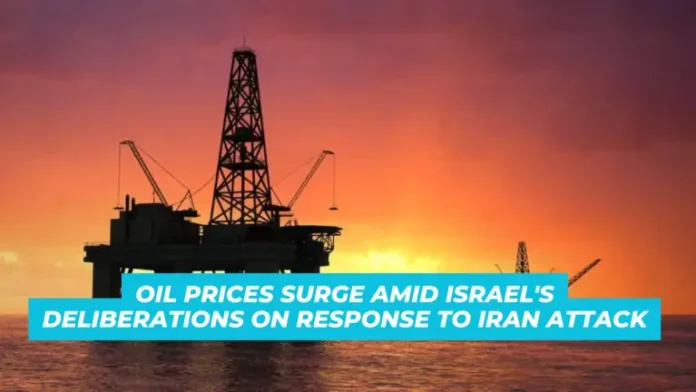The recent attack on an Israeli ship, reportedly carried out by Iran, has reignited fears of conflict in the Middle East, a region already plagued by instability. The repercussions of such events are felt far beyond the borders of the countries involved, with oil prices serving as a barometer of global geopolitical tensions.
On Tuesday, oil prices increased due to escalating tensions in the Middle East following remarks from Israel’s military chief, indicating the country’s intention to retaliate against Iran’s missile and drone attack over the weekend, despite calls for restraint from allies.
Background on Iran Attack
The attack in question targeted an Israeli-owned vessel in the strategic waterways of the Gulf of Oman. While the full extent of the damage is still being assessed, the incident has been condemned by Israeli officials as a brazen act of aggression by Iran. As tensions escalate, Israel finds itself at a critical juncture, weighing its response to this provocation.
Impact on Oil Prices
Unsurprisingly, the news of the attack has sent shockwaves through the oil market, leading to a rapid increase in prices. Investors and analysts alike are closely monitoring the situation, as any disruption to oil supplies in the region could have far-reaching consequences for global energy markets.
Market Reactions
The immediate aftermath of the attack saw a surge in oil prices, with benchmark crude reaching multi-month highs. This knee-jerk reaction underscores the vulnerability of oil markets to geopolitical events, highlighting the need for robust risk management strategies in an inherently volatile environment.
Geopolitical Implications
Beyond its immediate economic impact, the attack has broader geopolitical ramifications. The prospect of further escalation in the region has raised concerns among world leaders, who fear the destabilizing effects of a potential conflict between Israel and Iran.
Israel’s Decision-Making Process
As Israel deliberates its response to the attack, several factors come into play. The country must weigh the need to deter future aggression against the risk of sparking a broader conflict in the region. Additionally, Israel’s decision-making process is influenced by its strategic alliances and international obligations.
Oil Market Volatility
The incident serves as a stark reminder of the inherent volatility of oil markets. Historically, geopolitical events have been a major driver of price fluctuations, with even the slightest hint of instability sending shockwaves through global energy markets.
Strategies for Investors
For investors navigating turbulent markets, prudent risk management is essential. Diversification across asset classes and geographical regions can help mitigate exposure to geopolitical risks, while active monitoring of market developments allows for timely adjustments to investment strategies.
Future Outlook
Looking ahead, the situation remains fluid, with the possibility of further escalation or diplomatic resolution. The long-term implications for oil markets and geopolitics will largely depend on the actions taken by key stakeholders in the region and beyond.
Quick Review:
Q1.How might the conflict between Israel and Iran impact oil prices globally?
Ans. The conflict has the potential to disrupt oil supplies in the region, leading to a spike in prices due to concerns over supply shortages.
Q2.What are some strategies for investors to mitigate risks amid geopolitical tensions?
Ans. Diversification of investment portfolios, active monitoring of market developments, and maintaining a long-term perspective can help investors navigate turbulent times.
Q3.What role do geopolitical events play in shaping oil market dynamics?
Ans. Geopolitical events often serve as catalysts for price fluctuations in oil markets, as they can impact supply chains, production, and transportation routes.

